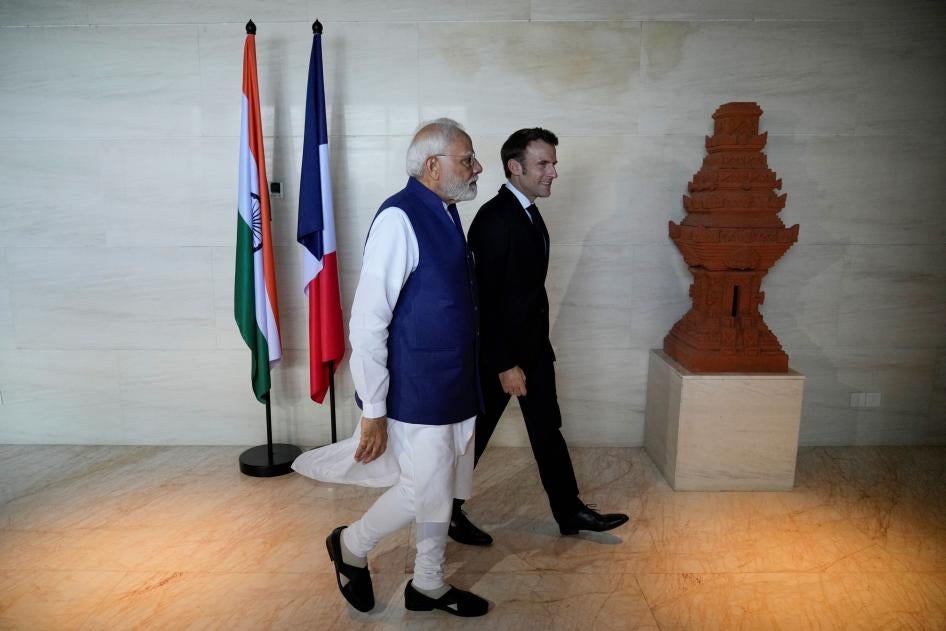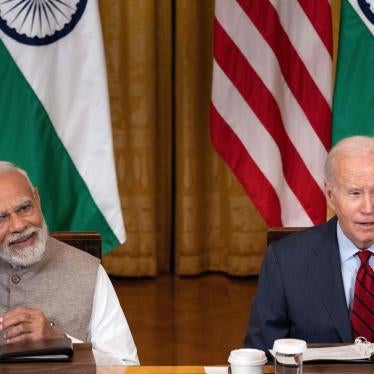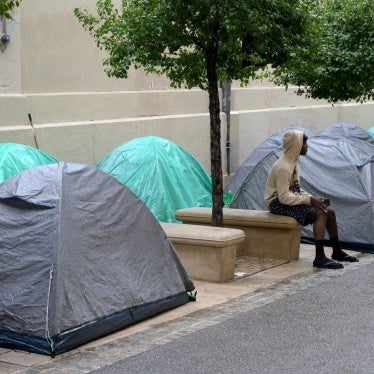Indian Prime Minister Narendra Modi will be President Emmanuel Macron’s guest of honor at the July 14 military parade to mark Bastille Day. It is deeply concerning that France should celebrate the ideas of liberty and equality with a leader whom many criticize for undermining democracy in India.
France is seeking stronger strategic, trade, and defense ties with India. Ahead of the visit, a joint statement by the two countries said they have “a shared vision of peace and security, especially in Europe and in the Indo-Pacific region, and defend the objectives and principles of the United Nations Charter.” India is an important geopolitical actor, but that, and France’s own significant shortcomings in addressing race-based discrimination, should not deter Macron from publicly expressing concerns about India’s growing human rights crisis.
In May, Hindu ultranationalist groups in India’s northern Uttarakhand state began an intimidation campaign against Muslims, demanding they close their businesses and leave town. These groups, affiliated to Modi’s Bharatiya Janata Party (BJP), in power at both the state and national levels, posted eviction notices outside Muslim-owned shops. During one of the demonstrations, crowds turned violent and vandalized Muslim shops. At least a dozen Muslim families reportedly fled the town in fear.
Instead of making efforts to calm growing communal tensions or protect Muslims from violence, the state’s BJP chief minister further fueled the conspiracy theories.
This latest incident is emblematic of systematic targeting of religious minorities, especially Muslims and Christians, since 2014, after the Modi government came to power, including through discriminatory laws and policies. BJP officials have frequently made hate-filled allegations against Muslims, Christians and other vulnerable communities, provoking violence by BJP supporters, who are then shielded from accountability by the police.
Government officials have instead summarily punished those peacefully protesting such abuses, along with their families and the larger Muslim community, a form of collective punishment, including by unlawfully demolishing their properties. Hindu ultranationalist groups have also attacked Christians in their homes during private prayer meetings and police have prosecuted them under false charges of forced conversion. Christians from Indigenous communities have been attacked and ostracized, and their homes burned down.
The BJP government has also been tightening its grip on civil society groups, using draconian laws to arrest and intimidate activists, journalists, opposition leaders, academics, peaceful protesters, and critics of government policies. This is shrinking the space for free speech, with independent journalists forced to self-censor. Through its abusive foreign funding law, Modi’s government has shut down funding for thousands of nongovernmental groups, particularly those that work on human rights or the rights of vulnerable communities.
The Modi government is also using technology to curtail rights. It has passed a regulation to increasingly restrict free speech online, and continues to impose the largest number of deliberate internet shutdowns globally. These shutdowns are often imposed to prevent or in response to anti-government protests. In the age of “Digital India,” which the government has promoted to make the internet vital to access public services, these shutdowns disproportionately hurt communities living with poverty that depend on the government’s social protection measures for food and livelihoods.
Macron has not spoken out about the deteriorating human rights situation in India. The French government should not repeat the same mistakes it made with the Chinese government by pursuing deeper trade engagement while largely sidelining human rights concerns. This sent the message that France cared little about the Chinese government’s efforts to suppress the rights of its citizens, inside and outside the country.
The French government is not exempt from criticism about its response to growing xenophobia, racist violence and discrimination. Nor has it been, as of late, a model of respect for freedom of expression and dissent. But Bastille Day should be a celebration of freedom.
The least Macron could do is to encourage his Indian counterpart to correct course to ensure all Indians are able to live with dignity and without fear, regardless of their caste, ethnicity, religion, gender, or political beliefs. And he should make clear that all Indians should be free to express their views online and beyond. Failing to do so would be an offense to the spirit of the French national holiday, and let down the many Indians who are striving bravely for their human rights.









